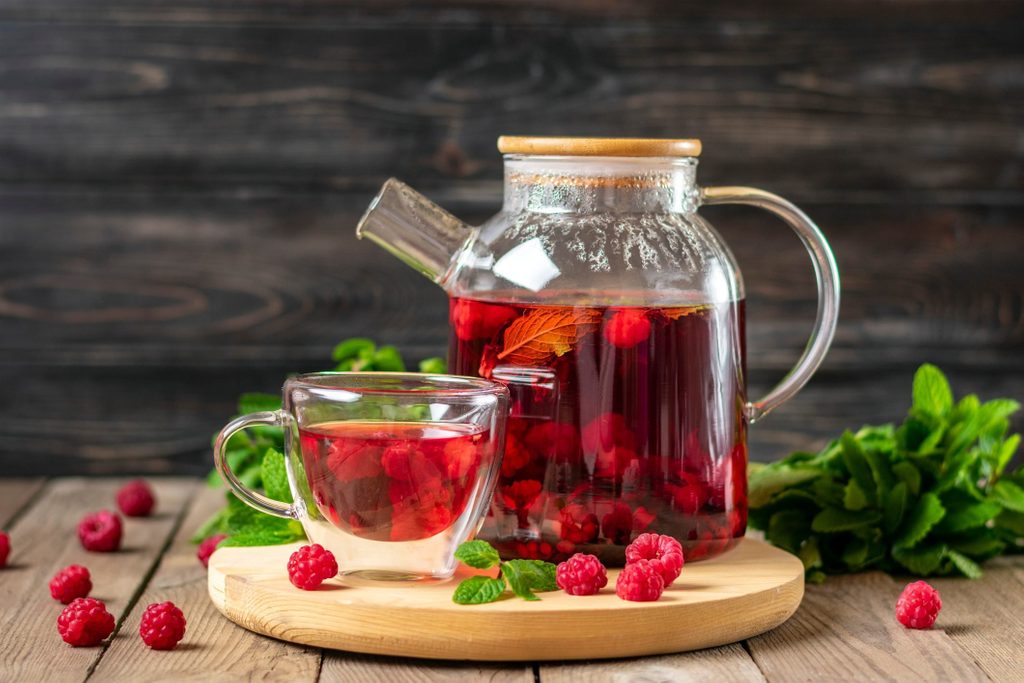Why You May Want to Start Drinking Red Raspberry Leaf Tea This Year

Fans of red raspberry leaf tea say the earthy-tasting drink can help in pregnancy, shorten labor, reduce premenstrual cramps, and provide several anti-aging antioxidants. Here's what experts say about the risks and benefits.
Even if you’ve never sipped red raspberry leaf tea, you’re no doubt familiar with the popular plant. Red raspberry leaf is, of course, the leaf of the red raspberry plant.
If you’re a tea drinker, you might brew a cup for the warming, calming benefits. But tea can have other effects. Some types may be able to reduce the risk of cancer or type 2 diabetes, or have weight loss benefits.
Proponents of red raspberry leaf tea say the earthy-tasting drink provides several anti-aging antioxidants and can aid in pregnancy by shortening labour.
(Related: What Happens to Your Body When You Drink Tea Every Day)
Nutrition facts of raspberry leaf tea
Tea is known for being high in antioxidants. For example, green tea contains several antioxidants including epigallocatechin-3-gallate (EGCG, for short), which is believed to block production of molecules that cause joint damage in people with rheumatoid arthritis.
Red raspberry leaf tea is also high in antioxidants and some nutrients, says Alicia Galvin, RD, a registered dietitian in Dallas. But drinking the tea isn’t the same as eating food rich in those vitamins or taking supplements. “You’d have to drink quite a bit of tea” in order to reap the health benefits, she says. Still, the nutrients found in red raspberry leaf tea contribute to your overall intake throughout the day—and every bit counts.
(Related: Is Green Tea as Healthy as We Think?)
What is red raspberry leaf?
The raspberry plant, officially Rubus idaeus, has green leaves that are studded with juicy red raspberry fruits. The leaves are packed with tannins like ellagic acid, flavonoids, and some phenolic acids like chlorogenic acid, which are also found in coffee.
Thanks to the tannins, the taste of red raspberry leaf is astringent—if not a bit bitter—which some people liken to a very slightly sweet black tea.
What’s in raspberry leaf tea?
When buying the tea, flip the package around to see how much raspberry leaf is actually included in each tea bag, as well as if there are any added ingredients.
Each brand contains a different amount of red raspberry leaf, and some have created a red raspberry tea that is made of a blend of additional herbals that will add a sweet, fruity taste.
What is consistent, though, is the calorie count. There are zero calories in one cup of plain brewed tea.
(Related: 6 Rooibos Tea Benefits That Make It Worth Buying)
Possible benefits: Premenstrual cramps, pregnancy, and labour
You may have heard that drinking red raspberry leaf tea can help to jumpstart or shorten labour. In fact, pregnant women have used the tea to help ease delivery for centuries. But does it really help?
Red raspberry leaf is said to act on the uterus to help it contract. Anecdotally, women drink the tea to help relieve menstrual cramps. But researchers don’t know if it works or is safe during pregnancy.
“There are not enough studies to support the safety or adverse reactions in pregnancy,” says Seema Sharma, board-certified ob-gyn at Westmed Medical Group in Purchase, New York. Much of the research, she notes, has been done in animals.
In a review of studies published in 2019 in Obstetrics and Gynecology, the researchers found one 2011 study linking the use of red raspberry leaf during pregnancy to a 3.5-fold increased risk of cesarean section. However, the authors note that the group was relatively small—only 34 women out of 600 in the study.
“Until there are more safety data, it could be suggested that raspberry leaf should not be used for labor induction because its adverse effects may outweigh its perceived benefit,” the authors of the 2019 review concluded.
Another case-study found that a woman with gestational diabetes who consumed raspberry leaf tea at 32 weeks of pregnancy developed hypoglycemia, or blood sugar that was too low. She was taking insulin, and the study authors suggest that the tea may affect the insulin needed to treat high blood sugar in people with gestational diabetes.
(Related: Coffee vs. Tea—Which One Is Better for You?)
Possible benefit: Lowers inflammation
Red raspberry leaf is rich in polyphenols, plant compounds that have antioxidant properties. Even better: The leaves have been found to have higher concentrations of these anti-aging compounds compared to the fruit itself.
Not only do antioxidants protect cells from damage, they also help with lowering inflammation, says Galvin. Inflammation is linked to a number of chronic diseases, including heart disease, type 2 diabetes, and perhaps even Alzheimer’s disease.
Side effects and health risks of red raspberry leaf tea
If you start drinking red raspberry leaf tea and notice a change in bathroom habits, it’s probably your new tea, as it can have some laxative properties, says Galvin.
“If you are already dealing with loose stools or diarrhea, proceed with caution,” she says. The tea may also be a mild diuretic, so you may notice you have to pee more often.
How much should you drink?
There’s no universal recommendation on how much to drink. If you are pregnant, talk to your doctor before consuming the tea. Dr. Sharma, for one, does not recommend her patients use herbal supplements, including red raspberry tea during pregnancy, as supplements are not regulated.
Otherwise, you can include it in your diet, as long as you enjoy it and it doesn’t cause bothersome side effects.
Next: This Healthy Herbal Tea Will Replace Your Energy Drink Obsession




